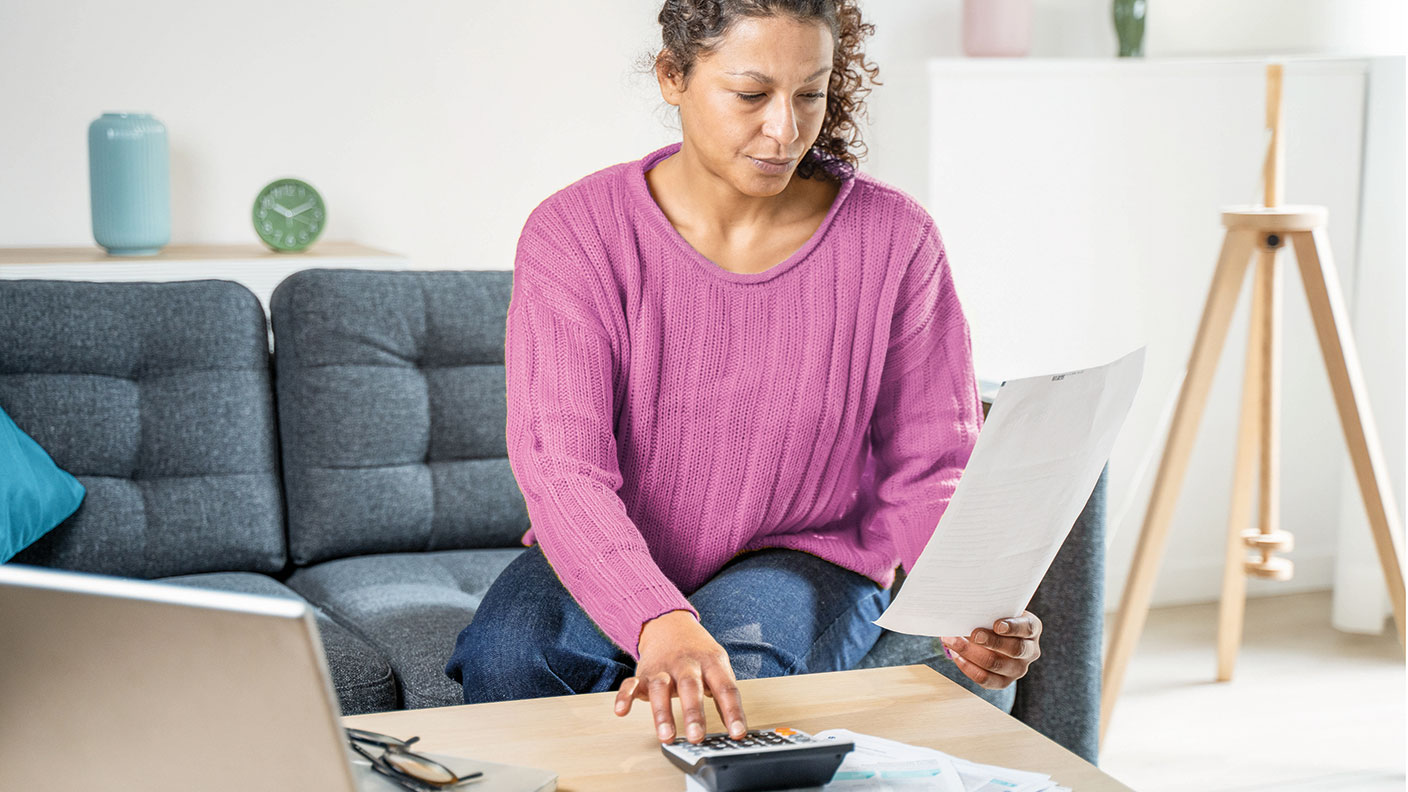Interactive investor launches managed ISA – is it any good?
If you want to invest but don’t know where to start, a managed ISA could be a good solution. Here's a first look at interactive investor’s new product and how it compares to others in terms of fees, investment choice and service.


Get the latest financial news, insights and expert analysis from our award-winning MoneyWeek team, to help you understand what really matters when it comes to your finances.
You are now subscribed
Your newsletter sign-up was successful
Want to add more newsletters?

Twice daily
MoneyWeek
Get the latest financial news, insights and expert analysis from our award-winning MoneyWeek team, to help you understand what really matters when it comes to your finances.

Four times a week
Look After My Bills
Sign up to our free money-saving newsletter, filled with the latest news and expert advice to help you find the best tips and deals for managing your bills. Start saving today!
Interactive investor, the UK’s second largest investment platform, has launched a managed ISA service to help investors who are just getting started. If you are keen to open a stocks and shares ISA but don’t know what to include in it, a managed portfolio could be a good solution.
Interactive investor's managed ISA allows you to choose from ten different ready-made portfolios. The investment platform says this service will bring a “whole new dimension of simplicity, convenience, and value to the UK investing landscape”.
Interactive investor isn’t the only platform to offer a managed ISA product, though. The likes of Hargreaves Lansdown, Vanguard, AJ Bell and Wealthify all offer something similar.
MoneyWeek
Subscribe to MoneyWeek today and get your first six magazine issues absolutely FREE

Sign up to Money Morning
Don't miss the latest investment and personal finances news, market analysis, plus money-saving tips with our free twice-daily newsletter
Don't miss the latest investment and personal finances news, market analysis, plus money-saving tips with our free twice-daily newsletter
We look at how interactive investor’s new product holds up in terms of fees, investment choice and service. Plus, is a ready-made ISA a good fit for you, or would you be better off investing your £20,000 tax-free allowance elsewhere?
How does interactive investor’s ready-made ISA work?
Interactive investor’s new ISA, known as a managed ISA, helps clients get started on their investment journey by matching them with a ready-made portfolio. This is then handed over to investment experts to manage.
For many, a key barrier to investing is a lack of knowledge or confidence. That’s where ready-made, expert-managed products like this one can help. They give first-timers access to the same wealth-building opportunities as more seasoned investors.
But how does interactive investor’s ready-made ISA work?
Before opening a managed ISA with interactive investor, clients will be required to answer a series of questions. These will address how much they want to invest, and the level of risk they are willing to take.
Once clients have answered these questions, interactive investor presents them with a portfolio recommendation that they can review. Once they are happy, they can open the account. Investment experts then manage the investments from there.
Investors can select from five different levels of risk, and two different investment styles (index investing and sustainable investing). There are therefore 10 portfolios in total.
The index investment style “aims to keep costs low by not making frequent changes to the investments held”, interactive investor explains. It primarily invests in passive funds which track a benchmark.
The sustainable investment style also invests in passive funds predominantly, but combines them with funds that integrate environmental, social and governance considerations.
“We are always looking to do more for investors, and our new Managed ISA will be a game-changer for the many who want some support in choosing and managing their investments, or perhaps just want that extra level of convenience,” says Richard Wilson, chief executive at interactive investor.
How does interactive investor’s ISA compare to others on fees?
There are lots of things to consider when picking an investment platform for your ISA, but fees are one of the main things you should look at. High fees can erode your investment returns over time.
The below table looks at managed ISA products from five different providers. It compares the fees they charge on a £20,000 investment.
Interactive investor’s flat fee structure means it is competitively priced on an investment of this size, offering the cheapest deal of the group.
Investment of £20,000
| Provider | Account fee | Investment costs | Total annual costs |
|---|---|---|---|
| Interactive investor | £4.99 per month | 0.19% | £98 |
| Vanguard | 0.45% | 0.15% | £120 |
| Wealthify | 0.60% | 0.16% | £152 |
| AJ Bell | 0.25% | Typically 0.6-0.8% per year | £170-£210, plus a £1.50 charge each time you buy or sell a fund |
| Hargreaves Lansdown | 0.45% | 0.91-0.97%, depending on the investment approach you choose | £272-£284 |
If you have less to invest, however, another provider might prove cheaper. We ran the figures on an investment of £10,000. In this scenario, Vanguard and Wealthify both charge lower fees.
Investment of £10,000
| Provider | Account fee | Investment costs | Total annual costs |
|---|---|---|---|
| Interactive investor | £4.99 per month | 0.19% | £79 |
| Vanguard | 0.45% | 0.15% | £60 |
| Wealthify | 0.60% | 0.16% | £76 |
| AJ Bell | 0.25% | Typically 0.6-0.8% per year | £85-£105 |
| Hargreaves Lansdown | 0.45% | 0.91-0.97%, depending on the investment approach you choose | £136-£142 |
Of course, you can continue to top up your investment over time. ISA rules allow you to stash away £20,000 each tax year.
So, even if you don’t have £20,000 to invest initially, it is possible that you will be able to build your account balance up to this threshold within a few years – at which point a flat fee structure could be more beneficial. What’s more, hopefully your pot will grow as you build investment returns.
This is something to bear in mind if you don’t want to end up having to switch your provider further down the line. Switching can mean selling your investments at an inopportune time, which can dampen investment returns.
Does interactive investor offer a similar service to other managed ISAs?
Interactive investor’s managed ISA service works in a similar way to others on the market. For example, most start with a series of questions to find out how you feel about risk.
Most providers also give you some degree of choice in terms of the investment style you want to follow. For example, would you like to integrate sustainability criteria into your portfolio?
Once you have chosen your portfolio, most providers then manage it on your behalf. Let’s look at Vanguard, for example. This provider promises to “monitor your investments regularly and make changes to keep you in the right level of risk”.
One provider that takes a slightly different approach is AJ Bell with its starter portfolios. These are more of a halfway house between a fully-managed ISA and a DIY account.
AJ Bell clients can choose from four different portfolios – “cautious”, “balanced”, “adventurous” and “income”. Once clients have selected one, they can adjust the asset allocation and add other funds from the provider’s “favourite funds” list.
Once the starter portfolio is set up, the AJ Bell client is responsible for managing it themself.
If interactive investor clients want to enjoy the best of both worlds, combining managed ISA investments with more of a DIY approach, this is also an option. The investment platform allows them to do this at no extra cost, within the same flat subscription fee.
Is a managed ISA right for me?
If you are new to investing or don’t have time to research and manage your investments yourself, then a managed ISA could be a good idea.
It doesn’t offer the same level of flexibility as a DIY account, though. As such, you might prefer a regular stocks and shares ISA if you already have a good idea about what funds or assets you would like to hold.
If you opt for the DIY approach, bear in mind that you will also need to set aside time to manage your investments. This will include rebalancing your portfolio to ensure you maintain a decent level of diversification and the right amount of risk.
Of course, stocks and shares ISAs aren’t the only option on the market. You could also consider a cash ISA if you need your wealth to remain liquid. Likewise, you might prefer a cash ISA if you aren’t willing or able to take on any investment risk.
Cash ISAs have become increasingly attractive in the last couple of years, thanks to higher interest rates. The best cash ISAs are currently offering savings rates north of 5%.
However, remember that stocks and shares almost always outperform cash over the long run. What’s more, interest rates have now peaked and the best savings deals are already starting to be pulled.
Inflation is another important consideration, as it can erode the purchasing power of your money. If interest rates fall below inflation at some point in the future, then you will actually be losing money in real terms.
Cash was offering negative real returns for over a decade in the aftermath of the global financial crisis. Real cash returns have only turned positive in recent months, as inflation has been slowing but interest rates remain high.
If you have an investment horizon of three to five years or more, your money is usually better off in the stock market. But you should always keep some cash tucked away in a rainy day fund for emergencies. It is usually a good idea to build enough of a cash buffer to cover six months’ worth of expenses.
Get the latest financial news, insights and expert analysis from our award-winning MoneyWeek team, to help you understand what really matters when it comes to your finances.
Katie has a background in investment writing and is interested in everything to do with personal finance, politics, and investing. She previously worked at MoneyWeek and Invesco.
-
 Should you buy an active ETF?
Should you buy an active ETF?ETFs are often mischaracterised as passive products, but they can be a convenient way to add active management to your portfolio
-
 Power up your pension before 5 April – easy ways to save before the tax year end
Power up your pension before 5 April – easy ways to save before the tax year endWith the end of the tax year looming, pension savers currently have a window to review and maximise what’s going into their retirement funds – we look at how
-
 Interactive Investor launches £5.99 a month Sipp - is it any good?
Interactive Investor launches £5.99 a month Sipp - is it any good?The flat-fee platform says it is leading a pension pricing shake-up. But how does it compare to other pensions on the market? We have all the details.
-
 How to earn a higher rate on your spare cash in ISAs and SIPPs
How to earn a higher rate on your spare cash in ISAs and SIPPsTips Money-market funds can help investors get more interest on balances in Isas and Sipps
-
 A new low-cost Sipp from Interactive Investor
A new low-cost Sipp from Interactive InvestorAdvice Savers with accounts of all sizes could benefit from lower fixed fees in this new low-cost Sipp from Interactive Investor.
-
 The best brokers for your Isa
The best brokers for your IsaFeatures We asked MoneyWeek readers for their views on the top stockbrokers. Here are the results of our survey.
